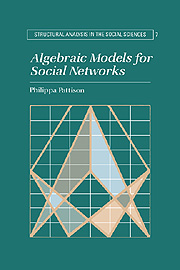Book contents
- Frontmatter
- Contents
- List of figures and tables
- Preface
- 1 Algebraic representations for complete social networks
- 2 Algebraic representations for local social networks
- 3 Comparing algebraic representations
- 4 Decompositions of network algebras
- 5 An analysis for complete and local networks
- 6 Time-dependent social networks
- 7 Algebras for valued networks
- 8 Issues in network analysis
- References
- Appendix A Some basic mathematical terms
- Appendix B Proofs of theorems
- Author index
- Subject index
3 - Comparing algebraic representations
Published online by Cambridge University Press: 21 October 2009
- Frontmatter
- Contents
- List of figures and tables
- Preface
- 1 Algebraic representations for complete social networks
- 2 Algebraic representations for local social networks
- 3 Comparing algebraic representations
- 4 Decompositions of network algebras
- 5 An analysis for complete and local networks
- 6 Time-dependent social networks
- 7 Algebras for valued networks
- 8 Issues in network analysis
- References
- Appendix A Some basic mathematical terms
- Appendix B Proofs of theorems
- Author index
- Subject index
Summary
For both complete and local social networks a two-level representation of social structure has been defined. The first level constitutes the relational foundation; for entire networks it is a collection of network relations, and for partial networks it is the ego-centred local network. The second level is a derivative algebraic structure, a more abstract representation describing relationships between relational components from the first level. In the case of entire networks, this second-level representation is the partially ordered semigroup of the network; in the case of local or partial networks, it is the local role algebra.
In evaluating this algebraic level of representation, we are not restricted merely to the task of establishing that the definition of the algebraic level from the relational one is meaningful, useful though that is. Rather, some additional mathematical investigation can provide extra information about the usefulness of the representation. This mathematical exploration has two major aspects. The first is a search for an exact account of the way in which properties of the algebraic representation record properties of the relational one. For example, the task of describing the relational implications of equations or orderings in the partially ordered semigroup or local role algebra falls into this class of mathematical problems. The associated empirical problem is that of establishing the empirical significance of relational features made explicit by the representation.
The second aspect is less direct but corresponds to a central issue in the measurement of any phenomenon.
- Type
- Chapter
- Information
- Algebraic Models for Social Networks , pp. 90 - 134Publisher: Cambridge University PressPrint publication year: 1993

